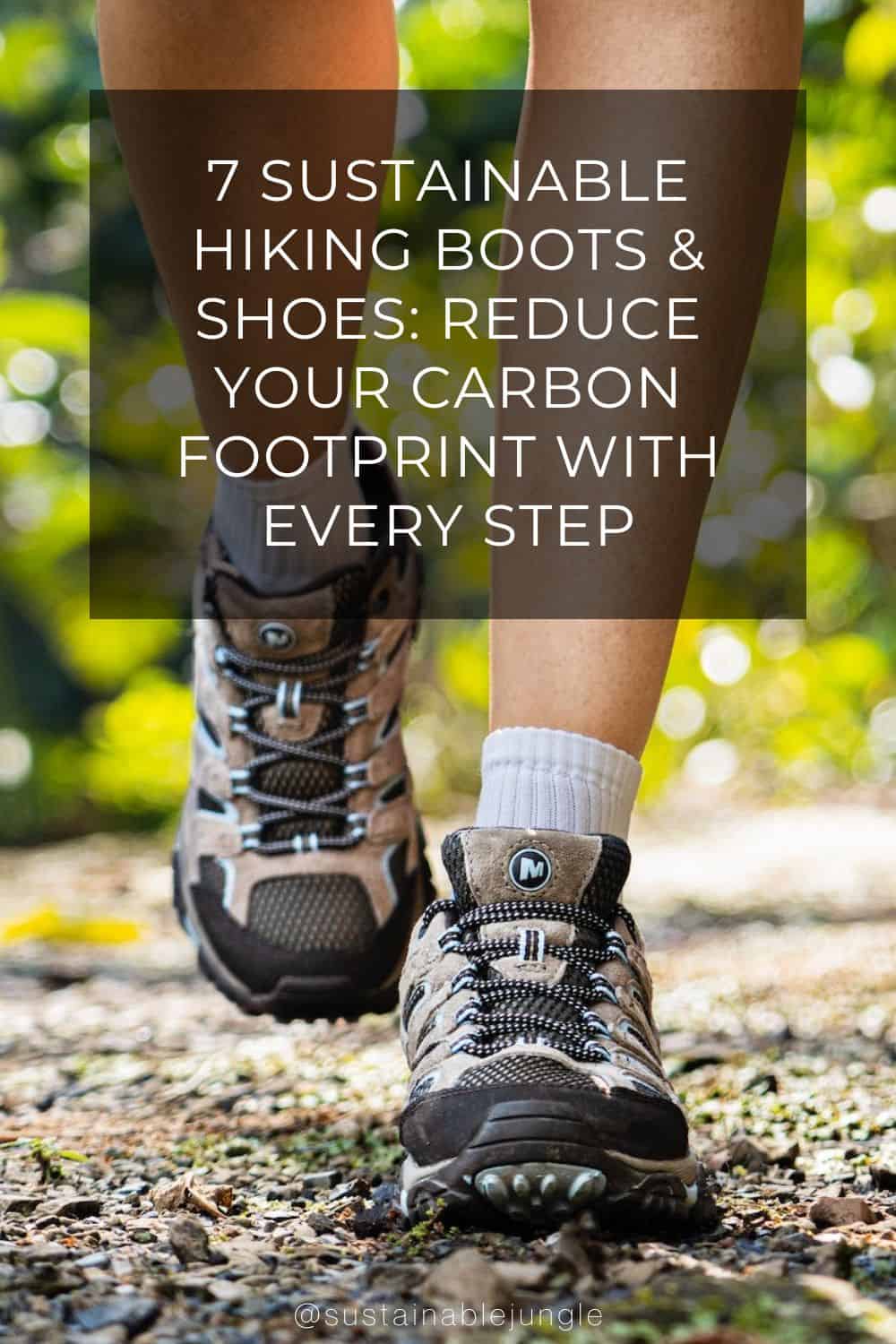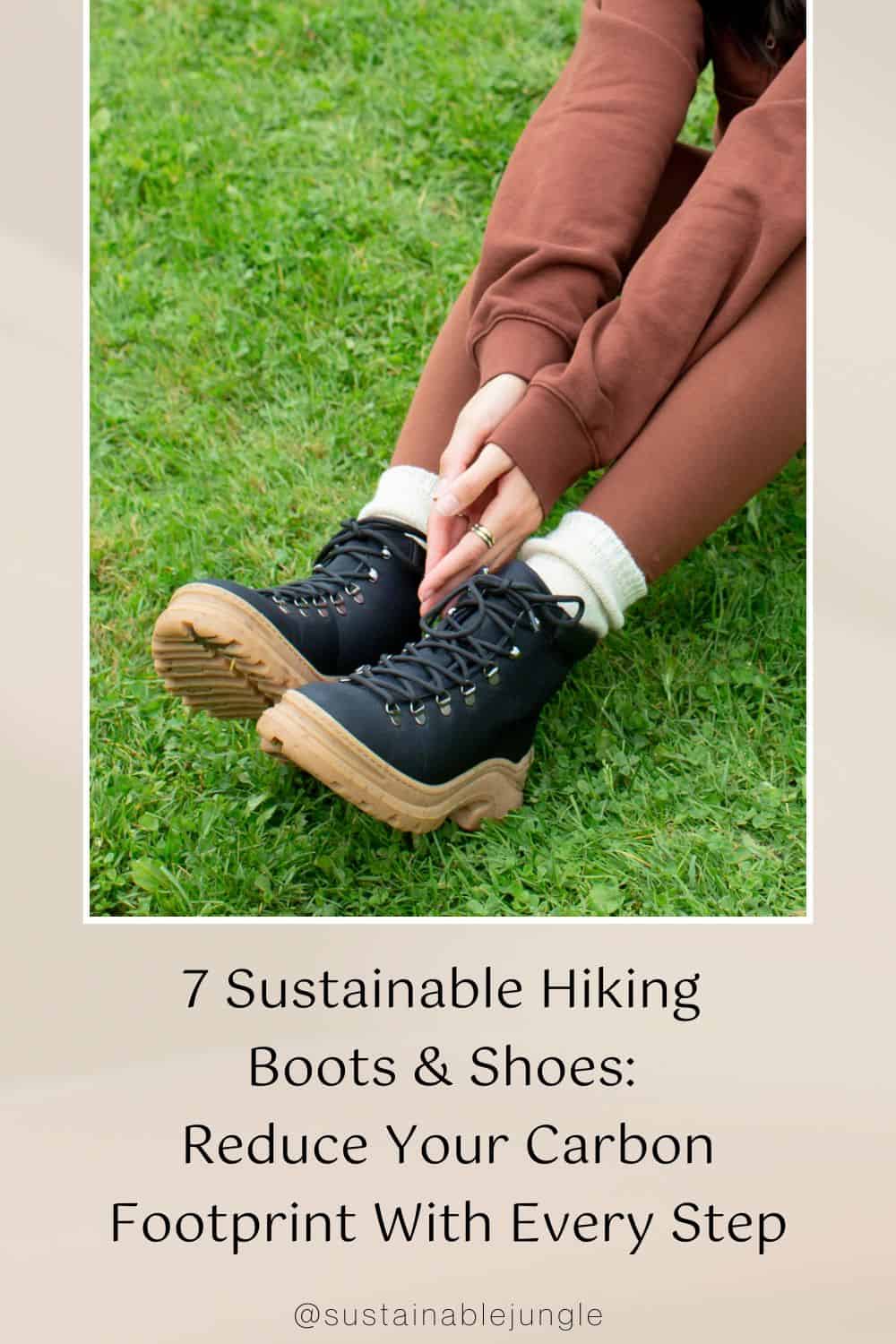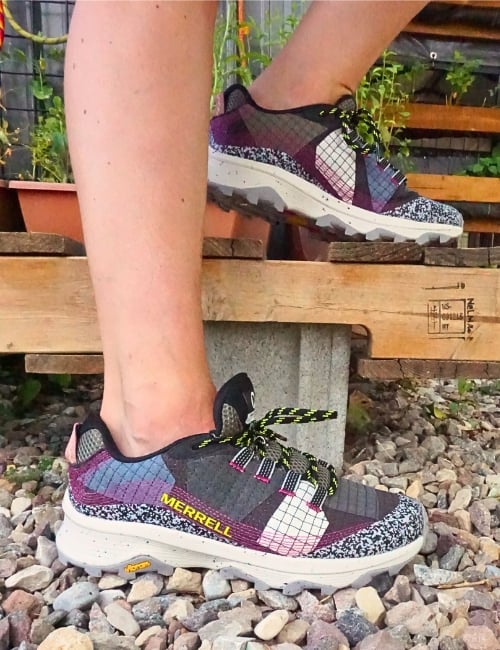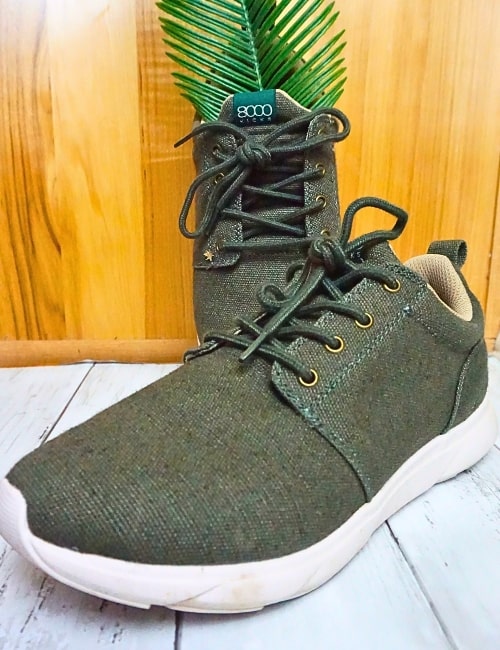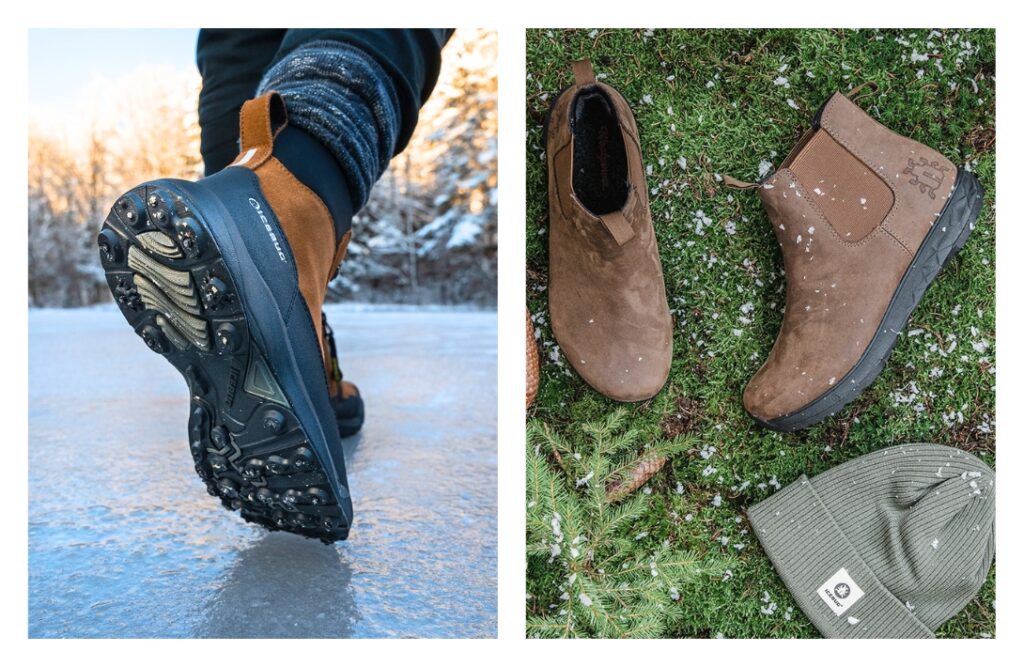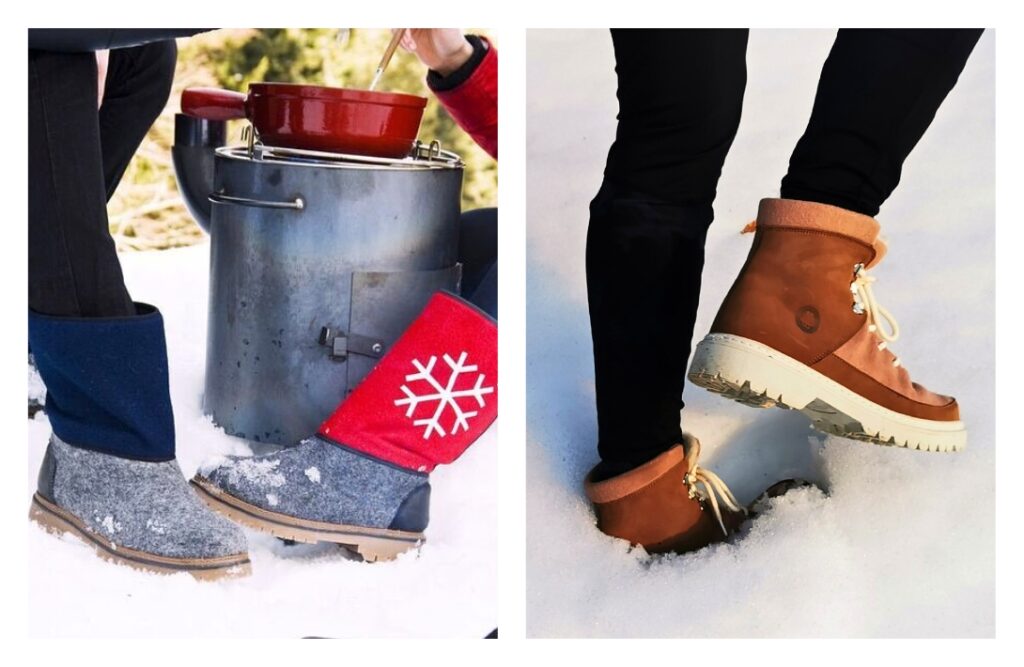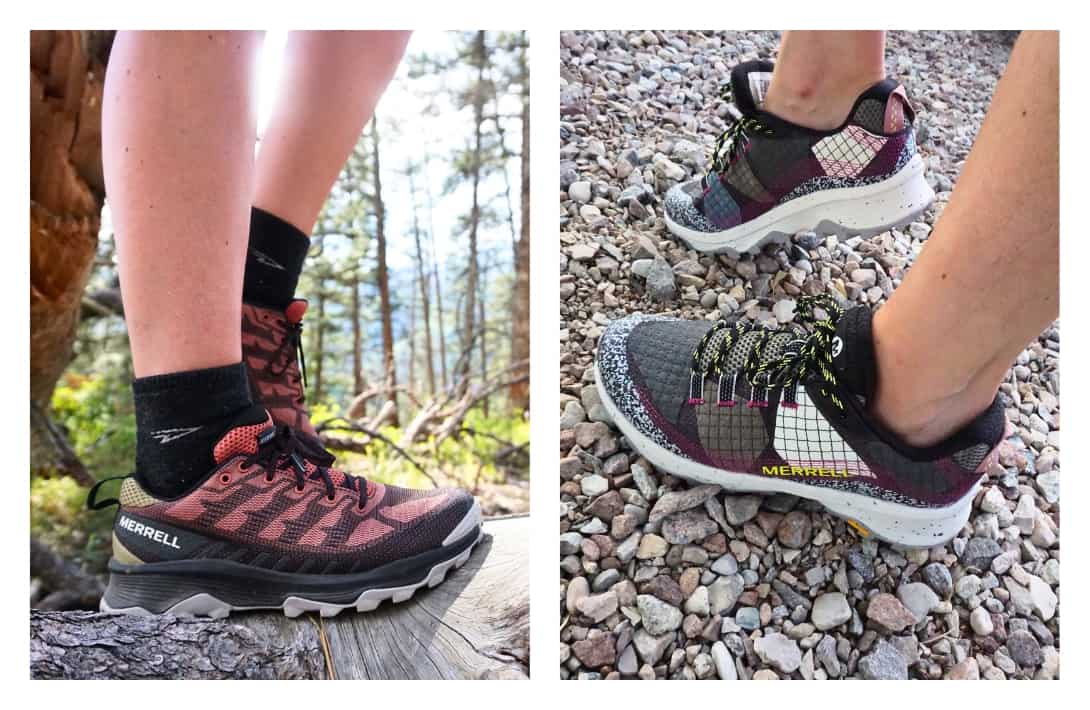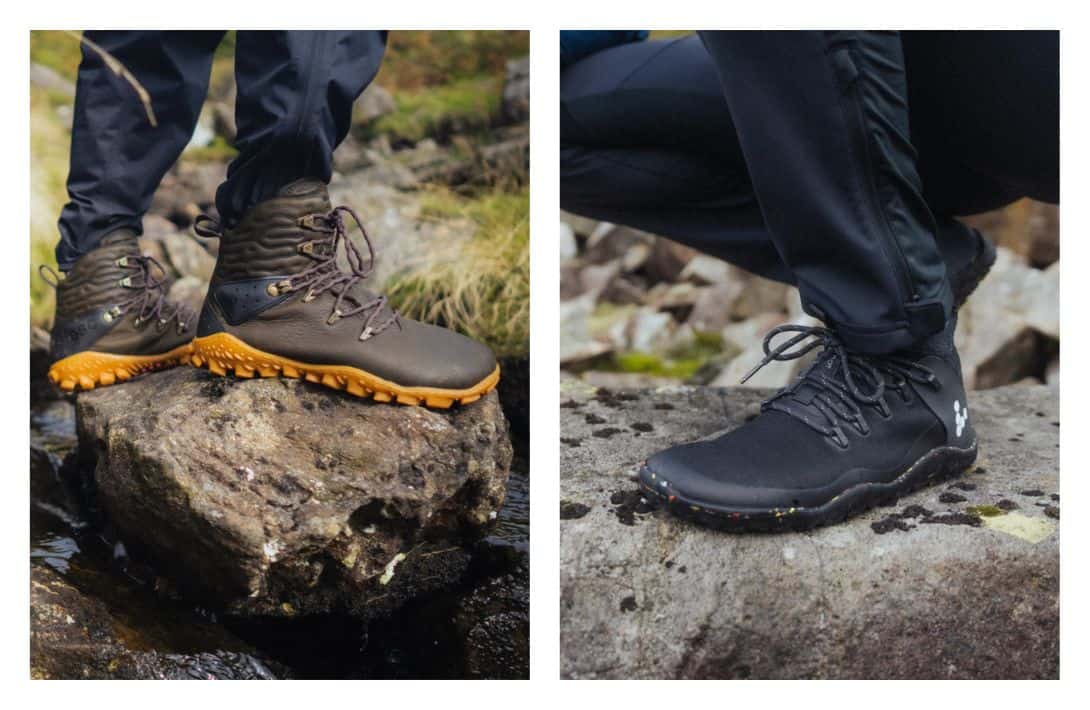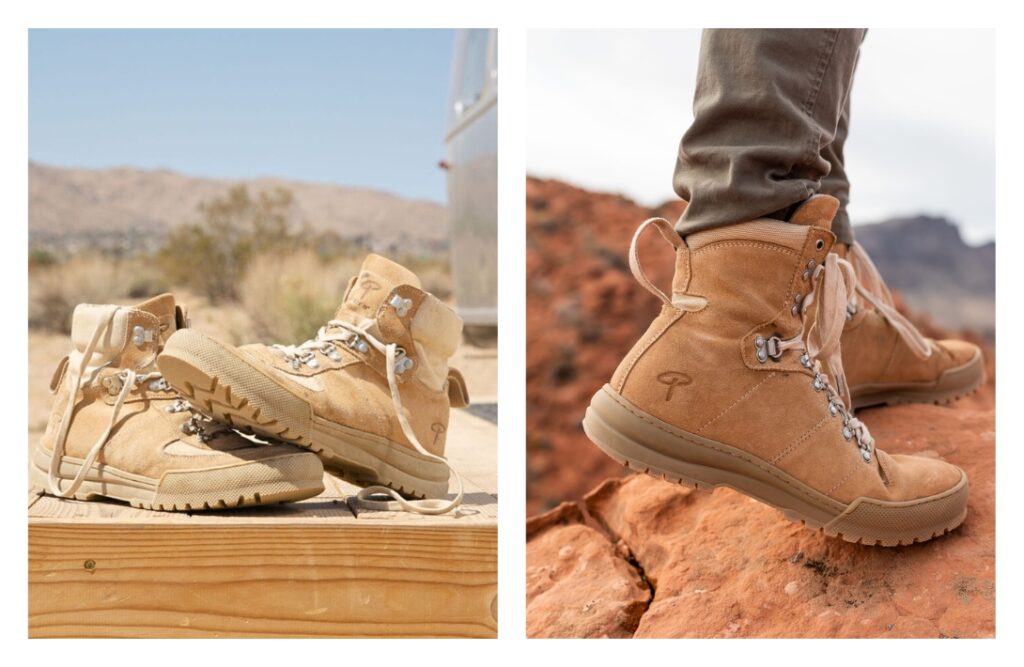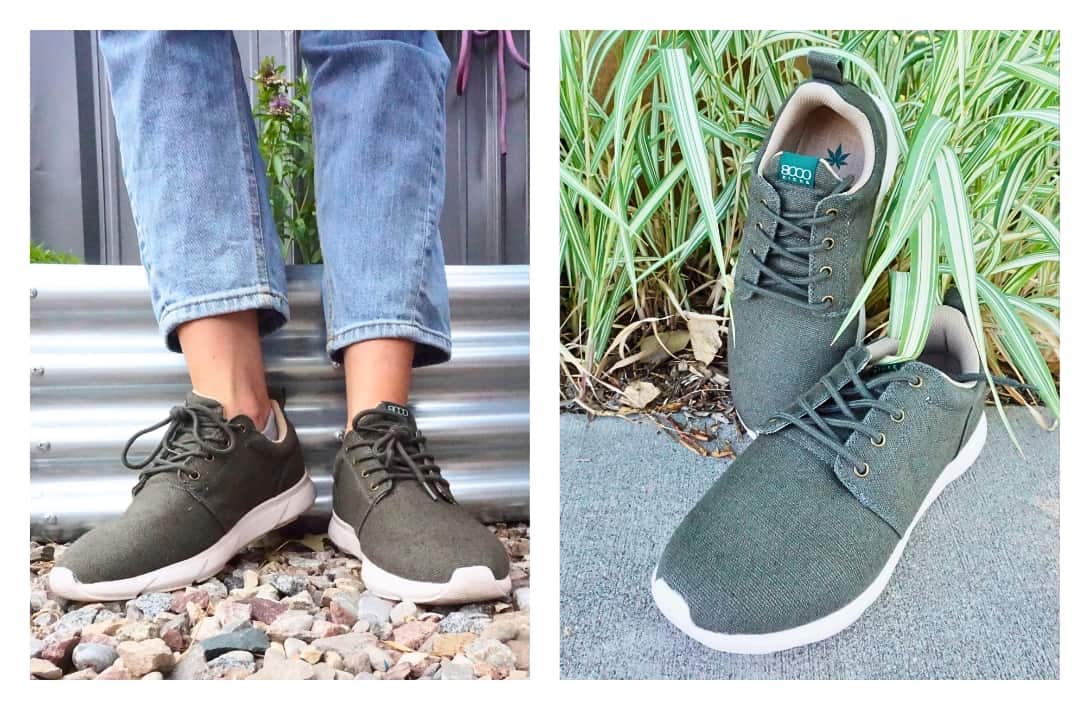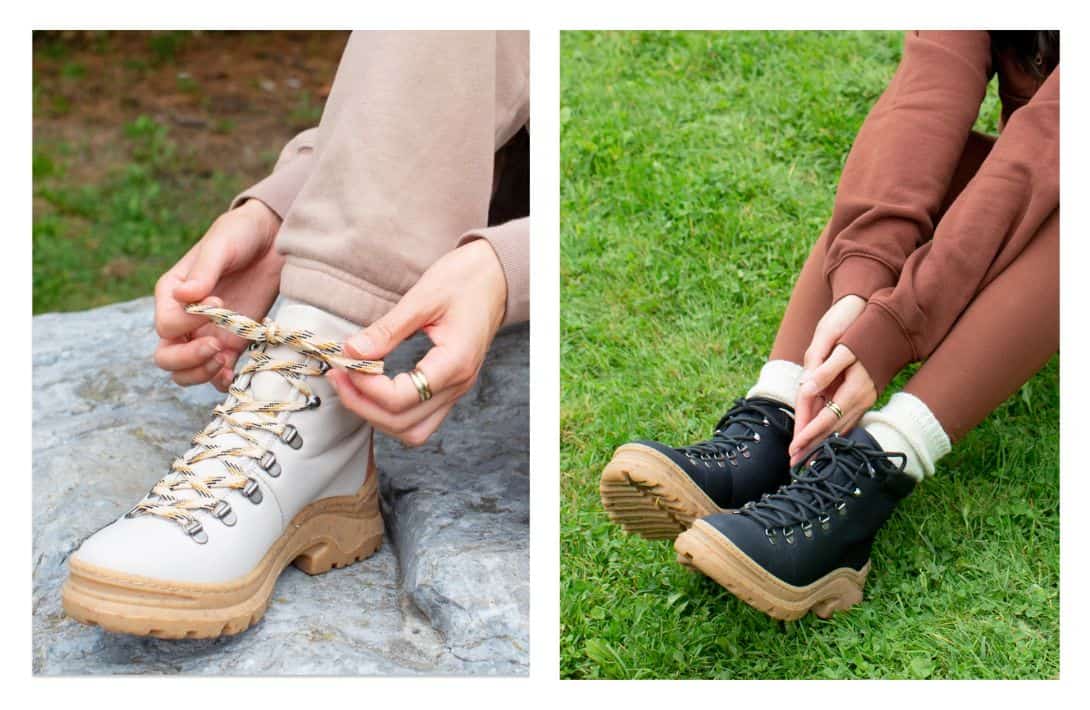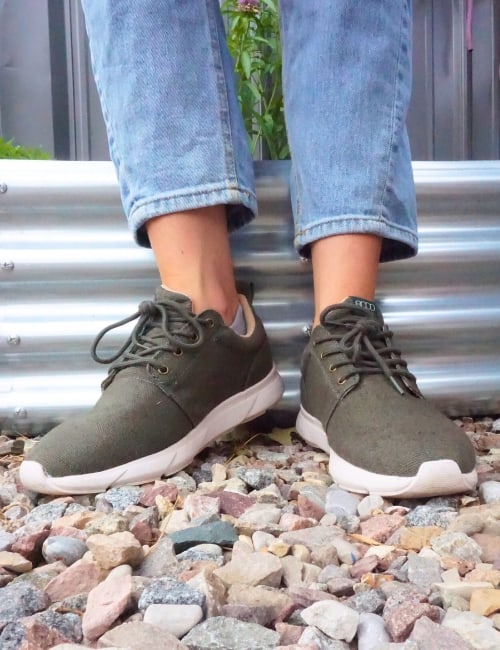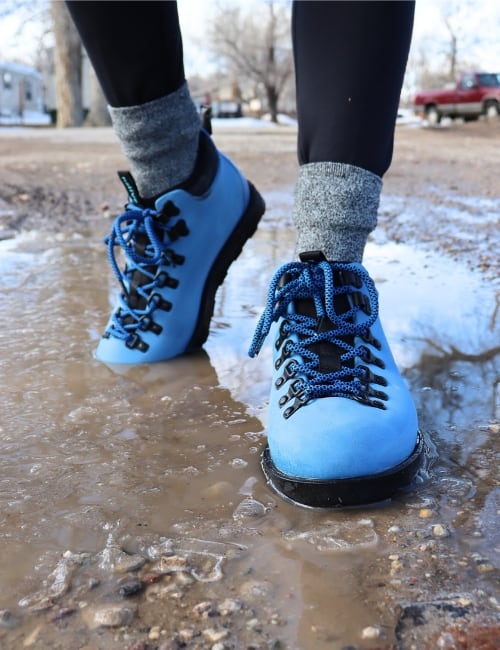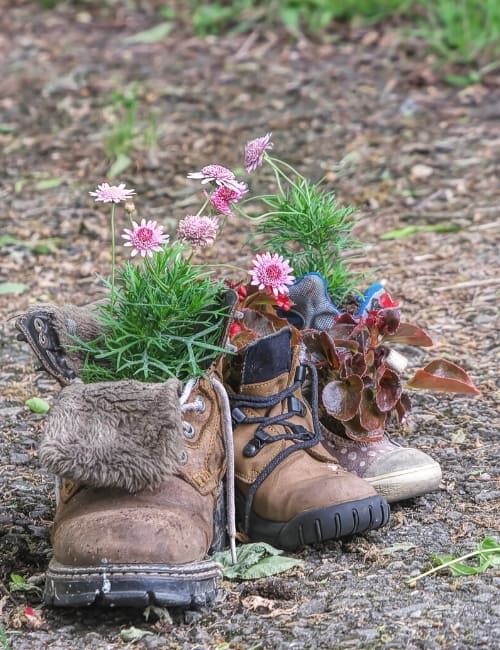7 Sustainable Hiking Boots & Hiking Shoes Reducing Your Footprints
Traversing mother nature’s backyard is fun, but doing so in sustainable hiking boots takes hitting the best nature walks and trails to a hike-er level.
Americans throw away over 300 million pairs of shoes each year—95% of which end up in landfills, creating a mountain even the most avid of hikers would avoid.
Finding ethical hiking shoes made from natural or recycled materials is essential to avoid the continued ascent of fast fashion.
If we don’t, it’s all downhill for the planet—and unlike for the hike out, that’s a bad thing. We’ve taken the time to find the best brands making eco-friendly, durable hiking boots, so by the time you make it to your eco camping site, you can kick your feet up and relax.
Everything we recommend to you on Sustainable Jungle is independently researched and we ask all brands to confirm their claims. To avoid waste, we test products on an as needed basis. This post contains affiliate links. If you buy something through our links, we may earn a small commission. Learn more about why we do this here.
Gain Serious Eco Elevation With These Eco-Friendly Hiking Boots
What is the most sustainable hiking shoe?
We can’t wait to bug out in Icebug’s environmentally friendly hiking boots that go above and beyond with sustainable materials, ethical production practices, and replacement services.
Vivobarefoot’s eco-friendly hiking shoes rule the trail with ethical materials and research-backed evidence to support comfort, mobility, and performance.
Trot over to the bottom to see how we found the best sustainable hiking shoe brands.
The Full List Of Ethical & Sustainable Hiking Boot Brands
- Icebug | Visit Store
- Baabuk | Visit Store
- Merrell | Visit Store
- Vivobarefoot | Visit Store
- Erem | Visit Store
- 8000Kicks | Visit Store
- Thesus | Visit Store
1. Icebug
About Icebug
Price Range: $139–$239
Icebug creates some of the best sustainable hiking boots on the market.
The Certified B Corp uses sustainable, synthetic, natural, and recycled materials to produce durable boots and shoes with various performance-specific features such as traction studs (for winter hiking), waterproof protection, BOA dial laces, and ankle support.
We love their high-top Larvik Hemp Biosole, for example, simply because it features 22% recycled materials and 45% bio-based materials, including hemp, wool, leather, algae, and natural rubber.
Icebug’s Ethical & Sustainability Practices
Materials:
For their sustainable running shoes and hiking shoes alike, they utilize algae biomass BLOOM™ foam insoles and midsoles and 23-62 % natural rubber outsoles.
Their wool padding is made of Responsible Wool Standard (RWS) certified wool sourced from New Zealand. Icebug’s recycled wool comes from the Swedish clothing company Woolpower.
They utilize recycled polyester in their eco hiking boots’ upper textiles, lining, webbing, and laces. Some uppers contain leather, but Icebug only works with Leather Working Group (LWG) gold-rated leathers and tanneries.
They choose OEKO-TEX-certified and bluesign®-approved materials whenever possible.
That said, Icebug still works with GoreTex fabrics for their waterproof boots, which may use hazardous PFCs during production.
Supply chain & labor practices:
Icebug is a member of the Fair Wear Foundation and works with four primary assembly factories located in Vietnam and China.
They commit to the Fairwear Code of Labour Practice and conduct regular audits to ensure their partners meet their code of conduct.
Thanks to their Follow the Footprints program, customers can scan the QR code on their product tag for complete information on its manufacturing chain.
Carbon commitments & green practices:
As a part of Icebug’s yearly reporting of climate impact, they measure all transports, including products to warehouses and customers, alongside business travel. The goal is to cut emissions in half by 2030.
Follow the Footprints also shows comprehensive impact assessments of each product.
Icebug offers customers responsible service options to extend product lifetime with replacement parts like new laces, studs, zippers, and more, making for a more durable hiking shoe.
Community & charitable giving:
Icebug supports a carbon dioxide tax, giving at least 1% of sales to non-profit environmental organizations through 1% for the Planet, like the Sustainable Trade Initiative and Protect Our Winters.
2. Baabuk
About Baabuk
Price Range: $159
If you’ve read any of our lists before, you know it’s hard to go wrong with Baabuk.
The company crafts sustainable hiking shoes from ethical resources that are built to withstand the toughest trails and environments.
While they only have one option specifically for hikers—the Ice Wooler—its ankle supportive design and sleek, unassuming look makes it a versatile choice for sidewalks and steep slopes alike.
Its wool body is not only naturally antimicrobial, but it’s also machine washable. No more plugging your nose when pulling out your boots for your next backpacking trip!
Baabuk’s Ethical & Sustainability Practices
Materials:
As with Baabuk’s all-wool sustainable slippers, the Ice Wooler features mostly Portuguese mulesing-free wool that’s ethically sourced from well-treated sheep. You’ll find it in the upper, lining, and insole.
It’s paired with a rubber sole, cotton laces, and genuine top-grain Nubuck cuff wrap for extra ankle support.
As for chemicals, it’s dyed with REACH-certified sustainable dyes and given water resistance with an environmentally friendly AQUAGUARD treatment.
Supply chain & labor practices:
The Certified B Corp works with partners in Portugal (where these boots are made) and Nepal due to their “long standing history with wool production”.
They have a fully traceable supply chain, ensuring safe working conditions, zero child labor, and 25% above the national average wage.
Carbon commitments & green practices:
Baabuk’s ethical hiking boots are hand-crafted or made with machines over 100 years old. The tradition, knowledge, and skills associated with wool is key to providing local jobs and keeping traceability at the forefront.
In addition to machine washability, you can purchase a repair kit for $5 to prolong their longevity.
If you’d like to return a product, they encourage gifting it to someone instead and getting 50% off your next order. This “U-Turn” incentive reduces shipping emissions.
Community & charitable giving:
In collaboration with ProSpecieRara, The Miss Baabuka Project was born to ensure the survival of six rare and endangered sheep breed populations in Switzerland.
3. Merrell
About Merrell
Price Range: $85–$120
The long-standing footwear manufacturer, Merrell, creates sustainable, recycled material hiking shoes for men and women.
Many of their boots are made from recycled materials (like recycled plastics) with varying degrees of ankle support, water resistance, traction features, and widths.
The Trail Glove is their version of an ultra-minimalist sustainable hiking shoe made from 100% recycled synthetic materials. Despite how slim and light it is, we found it to provide plenty of support when testing it. While we might not take it on a multi-day backpacking trip, it’s now our go-to shoe for day hikes.
Merrell’s Ethical & Sustainability Practices
Materials:
Many of Merrell’s eco-friendly hiking shoes are made from recycled and durable materials, used in the lining, laces, upper, footbed cover, and outsoles.
Some sustainable hiking boot styles that fall under this category include the Moab Speed, whose recycled synthetic uppers and body and Vibram® recycled rubber soles will help you stick to slick rocks without wasted rubber sticking to landfills.
They’re attempting to replace synthetic foams with better options, like BLOOM™ algae biomass foam or partially recycled EVA foam.
Merrell also has a new, limited run (for now) Scrap collection made entirely of production fabric scraps.
Supply chain & labor practices:
Merrell is a member of the Sustainable Apparel Coalition and owned by Wolverine Worldwide, and thus their supply chain adheres to its Code of Conduct.
Merrell claims their global partners adhere to ethical practices, though we don’t know of any related manufacturing certifications or locations. We’ve reached out and asked, but have yet to hear back.
Carbon commitments & green practices:
Merrell has six goals to achieve by 2025, including producing all products from 100% recycled, organic, or renewable materials.
Their other goals include reducing shoe apparel samples by 50%, minimizing plastic packaging, reducing water waste, completing 10,000 volunteer hours, and saving 300,000 shoes from ending up in landfills.
If you’re looking to recycle hiking boots yourself, check out Merrell’s ReTread recycling and resale program.
Community & charitable giving:
Merrell has given extensively over their many years in business, but their main giving partner is The Conservation Alliance. By partnering with Zappos Adaptive and Unlikely Hikers, Merrell’s The Trail Ahead program funds initiatives making the outdoors a safe, inclusive space.
4. Vivobarefoot
About Vivobarefoot
Price Range: $180–$280
Though the minimalist, barefoot design of their ethical, sustainable hiking boots might look skimpy, Vivobarefoot sure doesn’t skimp on any of their guiding principles.
The London-based company is dedicated to creating high-quality shoes with research-based evidence to ensure comfort, mobility, and performance.
Watch their documentary Shoespiracy for why you should consider switching to barefoot shoes—and rest assured knowing there’s a 100-day return period if you decide you don’t like them.
The animal-free Primus Trail II is one of their most popular shoes, made from post-consumer plastic waste and insoles made from algae.
Vivobarefoot’s Ethical & Sustainability Practices
Materials:
Vivobarefoot uses recycled plastic, bio-based, and all-natural materials to create its eco-friendly hiking shoes.
Some styles are leather-free, but others use Wild Hide ethical leather from their two partners in Pittars in Ethiopia and Thailand—each adhering to strict European environmental practice standards.
Vivobarefoot’s Merino wool is sourced from Australian Woolmark-certified farms.
They also use hemp and small percentages of BLOOM algae-based foam blended with EVA, foam, but are working to increase the percentage of this bio-based foam.
Supply chain & labor practices:
Aiming to be as transparent as possible, they publish distribution, suppliers, and manufacturing partners. Many of their partners are in China, Vietnam, Portugal, and other parts of Europe.
Vivobarefoot is a Certified B Corp and uses the Happiness Index—an external, anonymous feedback platform to measure employee engagement and well-being—to improve the work lives of their team.
Carbon commitments & green practices:
Vivobarefoot is dedicated to transforming its environmental impact through its Unfinished Business annual reports—which involve offsetting emissions, reducing water and manufacturing waste, and more.
They’re working with their tanning partners to eliminate the requirement of chemical additives and achieve a 100% natural tanning process.
As one of our favorite repairable shoe brands, Revivo is the brand’s way of providing free repair services for reconditioning, cleaning, and replacement for their resoleable hiking boots.
Inclusivity:
Vivo offers a foot assessment tool to help customers find the best eco hiking boots or shoes for them, whether they need a wider or smaller size.
Community & charitable giving:
Vivobarefoot launched the VIVOHEALTH program, a hub of assessment, resources, and courses to help individuals find the best footwear for their needs.
They founded the Live Barefoot Fund, provide loans for their Soul of Africa social enterprise in Ethiopia, and work with several other partners, including Fashion For Good and Wild Human.
5. Erem
About Erem
Price Range: $179–$199
Erem makes eco-friendly hiking boots built for scrambling over rocky terrain in the desert.
The company believes in a Biocircular™ standard, using only materials that can be safely returned to the environment when they reach the end of their lifespan.
The Xerocole® Expedition biodegradable hiking boots are built for extreme conditions with an ultra-high ankle supporting design.
If you want something a little lower with still ample ankle support, the plain Xerocole® might be for you.
Erem’s Ethical & Sustainability Practices
Materials:
Erem’s leather uppers feature vegetable-tanned leather that’s harvested and processed sustainably.
For linings, they use organic cotton and TENCEL™ lyocell, harvested from FSC sustainable forestry certified sources and processed in a closed-loop system.
Outoles contain 70% recycled rubber and a proprietary, added biodegradability accelerator that enables biodegradation in 7 years or less.
Other materials used in their sustainable hiking shoes include cork, organic cotton, linen, recycled wood fibers, and brass.
Supply chain & labor practices:
Most of Erem’s handcrafting is done in Portugal, with finishing touches in a nearby factory in Albania. However, Erem is actively seeking relationships with US partners for their repair program.
They partner with Toxnot, an industry-leading, third-party technology company, to enhance environmental compliance and transparency in their supply chain.
Carbon commitments & green practices:
Though they’re biodegradable, Erem’s Reboot program will take back used boots, providing customers with credit towards a new pair. The old boots are re-steamed into new pairs over and over again, reducing material waste.
Per their CarbonNeutral® certification, Erem works with leading experts on carbon neutrality and climate finance, Natural Capital Partners.
Community & charitable giving:
Erem is a 1% For the Planet member and the Conservation Alliance, specifically focusing their donations to desert-centric non-profits.
Through their Cactus Pear Program, Erem uses proceeds to plant prickly pear cacti, which are carbon-capturing (up to 400 lbs of CO2 per year per plant!), water-saving plants built for the desert.
6. 8000Kicks
About 8000Kicks
Price Range: $129–$199
8000Kicks crafts mostly waterproof vegan, sustainable hiking boots made from hemp.
No, you can’t get high on them, but they can help you get high into the mountains.
The Explorer V2 is a low-rise shoe made from hemp with algae Bloom Foam insoles. It’s breathable, naturally water-resistant, versatile, and lightweight, making it perfect for a quick trip outdoors.
For something a little heavier and more supportive, there’s the new Crossover Chelsea Boot.
8000Kicks’ Ethical & Sustainability Practices
Materials:
8000Kicks makes both casual sustainable sneakers and outdoor life shoes from hemp fabric and Bloom Foam algae soles.
While hemp itself provides some natural water repellency, these shoes are equipped with a proprietary PFC-free coating to protect the fabric from stains, liquids, and dust particles. It has a non-toxic OEKO-TEX certification.
Supply chain & labor practices:
8000 works with factories in Portugal, China, Romania, France, and the United States and spruced hemp from the first three countries, too.
However, the product pages don’t tell which product is made where, so we don’t know if these are made-in-the-USA hiking boots or not.
Regardless, they conduct regular inspections of their partners to ensure they meet their Code of Conduct. Currently, they have 60% supply chain traceability.
Carbon commitments & green practices:
8000Kicks keeps their impact low but partnering with renewable energy powered factories, planting carbon sequestering trees (and hemp—one of the largest carbon sink plants around), and processing the hemp using a non-chemical “steam explosion” process.
Products are shipped in recycled cardboard and fully biodegradable corn starch mailer bags.
7. Thesus
About Thesus
Price Range: $138–$220
For functional and fashionable hiking boots sustainable women can rely on in any situation, we have a hypothesis this brand will impress you as much as it has us.
Toronto-based brand, Thesus (formerly Alice & Whittles) wears its values on its soles, producing ethical hiking boots.
The Weekend Boot features a seam-sealed water-resistant upper, anti-slip rubber lug sole, and temperature control lining. The Scarlet colorway is our favorite, allowing you to hit the park, trails, or brunch in sustainable style.
Thesus’s Ethical & Sustainability Practices
Materials:
Their vegan hiking boots and clogs are made from 95% natural and recycled materials, like recycled PET plastic bottles, recycled ocean plastic, and repurposed natural rubber.
Their flagship Weekend Boots are 100% vegan and water-resistant, not waterproof.
Supply chain & labor practices:
What hiking shoes aren’t made in sweatshops?
Thesus’, for one. Their sustainable women’s hiking boots are handmade in a family-run factory in Portugal, where all staff are paid a living wage.
Carbon commitments & green practices:
Thesus is aligned with the UN’s SDGs to ensure they are at the forefront of essential causes like ocean pollution, climate change, and economic inequalities.
They aim to be a Climate Neutral Certified company by implementing strategies to reduce their carbon emissions.
Inclusivity:
Thesus is proudly BIPOC woman-owned and women-led, dedicated to achieving the best practices for equitable hiring, growth, and pay for all their team members.
Did you know we Have a Newsletter?
We cover the latest in sustainable living, fashion, zero waste, beauty, travel, finance and more…
How We Found The Best Eco-Friendly Hiking Boots
Your feet and the environment deserve all the love they can get.
That’s why finding sustainable waterproof hiking boots made from ethical materials built for any tail, park, or mountainside is a must.
But finding shoes that fit is already harder than navigating a rocky terrain with a blindfold on.
Just like we lean on our trekking poles on steep terrain, we leaned on our sustainable fashion guidelines to find the best sustainable hiking boot brands.
Materials:
A hiking boot needs to be durable, long-lasting, and comfortable, making it difficult to fit in responsible materials.
Natural material is always the best option, like organic cotton, linen, hemp, lyocell fabric, cork, and natural rubber.
Because they DO make for the most durable hiking shoes, leather uppers are still standard, and while ethical leather might sound impossible, it can be if it’s recycled. If not, we look for those sourcing from the byproduct leather industry and vegetable tanning methods.
We give the (hiking) boot to brands that support the direct killing of animals for their hides.
Because synthetic fabrics are nearly unavoidable in footwear, we look for recycled materials, and those that blend synthetic foams with biobased materials, like BloomFoam algae.
- Certifications: Leather Working Group (LWG), OEKO-TEX, Forest Stewardship Council (FSC), bluesign®, Forest Stewardship Council (FSC), Registration, Evaluation, Authorisation, and Restriction of Chemicals (REACH), Woolmark
Supply chain & labor practices:
The brands should adhere to codes of conduct and have transparent, traceable manufacturer chains. This ensures fair treatment, pay, and working conditions for all workers.
Certifications can help prevent greenwashing, but remember; they aren’t entirely perfect. Read up on B Corp greenwashing to identify and avoid the fakes.
- Certifications: B Corporation (B Corp), fair trade, Fair Wear Foundation
Carbon commitments & green practices:
From product recycling and plastic free packaging to carbon offset programs and plans to reduce emissions altogether, there are dozens of ways these brands can be more environmentally conscious.
Community & charitable giving:
While some are still getting their feet wet, brands giving back to their communities and providing customers with repair programs have a leg up on the competition.
Final Thoughts On The Most Sustainable & Ethical Hiking Shoes
Traditional hiking shoes often use low-quality and unethical materials.
Purchasing high-quality, sustainably made alternatives from these brands supports slow fashion and saves the planet, one step at a time.
About to hit the trail with some friends? Send them this list of sustainable hiking boot brands to help them get out in nature in something that won’t also negatively impact it.
Pin these:
